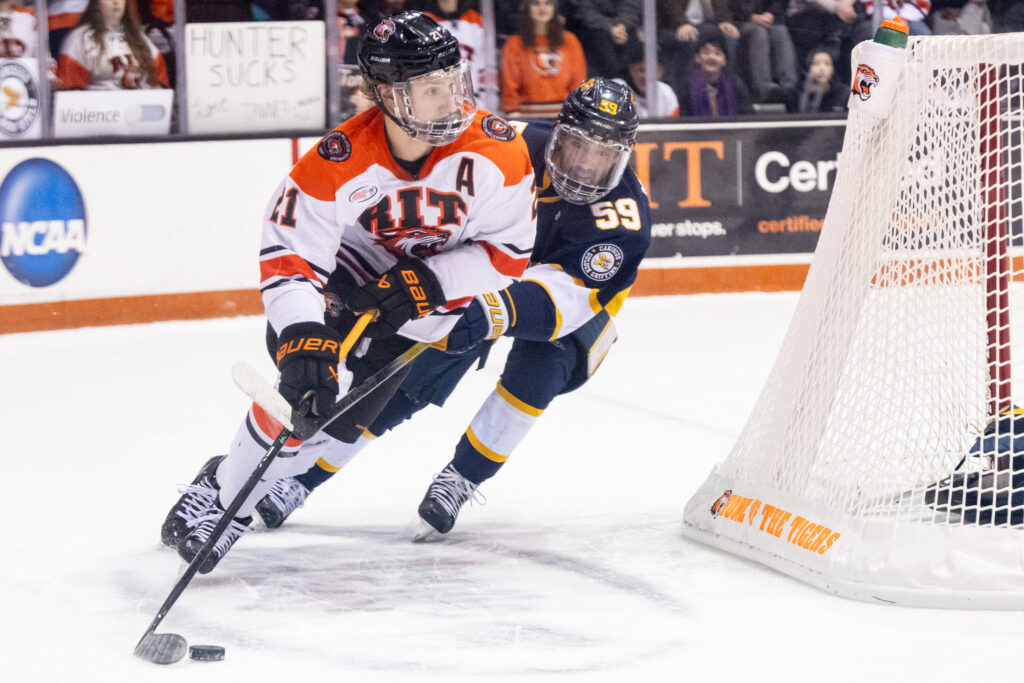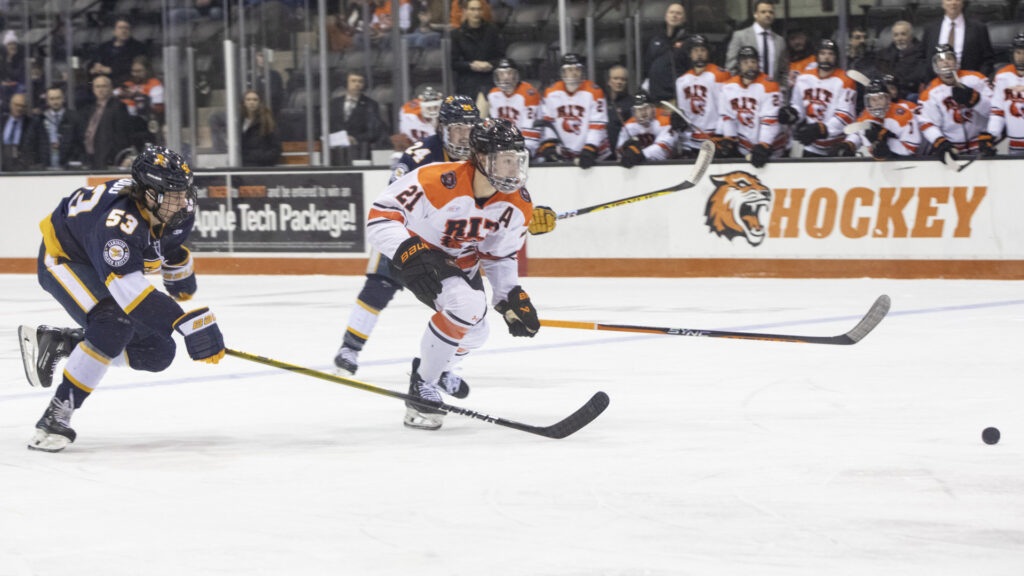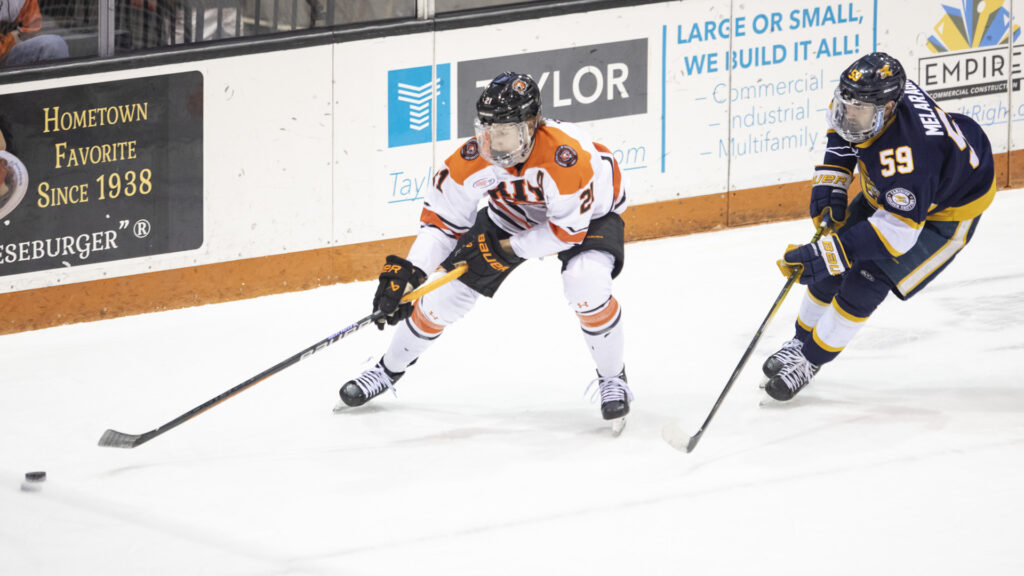
By KEVIN OKLOBZIJA
He had been named Atlantic Hockey’s rookie of the year as a freshman and player of the year last season, the first student-athlete in league history to accomplish the award daily double in successive seasons.
Add to the resumé invitations to the NHL development camps of the Calgary Flames and Vegas Golden Knights in back-to-back summers and Carter Wilkie would have been a prime attraction in college hockey’s transfer portal.
Except Wilkie had no interest in seeking more prestigious pastures somewhere else. Rochester Institute of Technology had been in his corner when very few schools were interested in his talents, so he was adamant about returning the loyalty favor last summer.
“RIT gave me the opportunity, they were the ones who were there from the start, so it didn’t feel right to turn my back to them,” the 23-year-old junior centerman said. “I had the opportunities I wanted. I was playing on the power play, I was killing penalties, I was scoring, I was getting attention from the pro level, I was going to development camps. It’s kind of like, if the wheel ain’t broke, don’t fix it.
“And I can’t give enough praise to the program for getting me where I’m at just because of the group I’m surrounded with and practice with and play with every single day.”
There was another reason he was intent on returning to RIT’s Henrietta campus for the 2023-24 season, though: Unfinished business.
The Tigers won Atlantic Hockey’s regular season championship in 2022-23 but were unceremoniously bounced out of the playoffs in the second round by Holy Cross. On home ice no less.
The loss stung. For Wilkie, it was even more painful. He was assessed a major penalty for kneeing and game misconduct in the first period in Game 3 of the best-of-three series. The Tigers lost 5-1.
“I don’t think I’ve been more upset or left more disappointed or empty after a season,” Wilkie said. “Not only that we lost, but not being able to help the guys, getting kicked out early on as I did. That was hard to get over personally.”
The quest for redemption begins this weekend. RIT, ranked 19th in the country, is again Atlantic Hockey’s top seed after winning the regular season title with an 18-7-1 record (22-10-2 overall). After earning a bye in last weekend’s first round, the Tigers play Robert Morris University in the best-of-three quarterfinals at 7 p.m. Friday and Saturday, and, if necessary, 5 p.m. Sunday.
Only winning the post-season title and advancing to the NCAA tournament will erase the bitter memories of last March.
“Being as high (in the standings) as we were with the team that we had, I just felt it was the wrong ending for that story,” said Wilkie, who has produced 14 goals, 20 assists and 34 points in 34 games this year. “Kind of like a movie where you don’t have the ending you want or dislike the ending. And it was the driving factor all summer, all season.”
Wilkie, a native of Calgary, Alberta, has already made his mark on the program. In 111 games over three seasons, he has 41 goals, 63 assists and 104 points, the fourth-fastest to 100 points in program history. He’s also just the fifth player in RIT’s Division I era to post three 30-point seasons.
Of course, with a nickname “Silkie Wilkie” that serves as his X (Twitter) handle, you better score.
“It started when I was 14 or 15,” he said of the nickname. “A family friend of ours, a buddy of mine on the team, his dad, tweeted out, ‘Silkie Wilkie’ and it just stuck.”
How could it not? Wilkie is a unique talent for RIT, a combination of speed, skill, size (6-foot-2, 200 pounds) and grit. The total package that, quite frankly, the Tigers had never really been able to recruit in the pre-athletic scholarship era. Wilkie accepted an academic offer to play at RIT in October of 2020, meaning a lot of other schools missed in their talent evaluations.
“You see him play now and wonder, ‘How was he in his 20-year-old year in junior and still there,’ ” linemate Cody Laskosky said. “He has the ability to take over a game in a single moment.”

RIT’s coaching staff understood that and wanted Wilkie in Henrietta.
“I think the coaches saw me for the player I am,” Wilkie said. “It’s a player who is a 200-foot centerman who can win faceoffs, kill penalties, and if you want him to play higher roles he can do that. If they want him to go out there and bang bod and hound on the forecheck, I can do that as well.”
Simply put, Wilkie said, “They allowed me to play the position I was. Obviously if you put any guy into my situation or any other players on our team in the situation I was given, I think they’re going to have the exact same acceleration or career as me.”
They’re also going to catch the attention of not just NHL scouts, but other schools eyeing the transfer portal. If Wilkie had expressed a desire to join one of college hockey’s glamor programs, there very likely would have been many opportunities.
But like another Calgary native, Cale Makar, who skated under the radar before bursting onto the scene late in his junior career, Wilkie believed in loyalty. While Makar now is a superstar defenseman with the Colorado Avalanche, only UMass-Amherst viewed him as a coveted recruit during his early years in the Alberta Junior Hockey League.
Until, that is, Makar blossomed in his final AJHL season, 2016-17. Then pretty much all of the NCAA wanted him. By then, however, it was too late.
“Every major program in the country tried to get Cale to de-commit and go with them, but he wasn’t reneging on his commitment to the school that committed to him,” said Steve Bartlett, the Pittsford-based agent who represents Makar and serves as the family advisor for Wilkie. “I give that same character assessment to Wilkie. He is staying loyal to the school the wanted him from the beginning.”
The COVID-19 pandemic worked in RIT’s favor during the recruiting process. Players already in school were given another year of eligibility because of the COVID-abbreviated seasons, so there were fewer openings on rosters. RIT did have open roster spots, though.
“We zeroed in on him and loved him,” RIT coach Wayne Wilson said.
The Tigers extended an offer on Oct. 20, 2020, a Tuesday. They wanted an answer by Thursday.
“They offered me pretty quickly,” Wilkie said. “I delayed a little bit, probably a little more than they wanted me to. They expected an answer on Thursday and I said I kind of needed the weekend to get through this process.”
After consulting with his parents, Gina and Randy, he phoned Wilson on the following Monday to accept the offer. Which was about the same time Minnesota-Mankato called and said they wanted him to play for the Mavericks.
“They said, ‘We really want you.’ Well, you should have told me this last week when I told you I had an offer and was making a decision,” Wilkie said, smiling about the memory.
Not that it would have mattered.
“Looking back, even if another offer had come in earlier, I don’t think I would have chosen it,” Wilkie said. “It was just a really good opportunity here, the direction the program was in. It just felt right.
“They offered an opportunity for me to play and they sounded like it was a fair chance whoever you are, it’s not just a hierarchy system. That was a big thing from the hockey side of it and academically you can’t really match RIT.”
Indeed, the education component was a major factor as well. Wilkie is majoring in biomedical sciences with the intention of becoming a chiropractor, like his father, or a physiotherapist.
“Hockey doesn’t last you forever,” he said. “Unfortunately, you are going to have to get a job if you want to keep living. I thought the whole academic and college lifestyle at RIT, along with the hockey atmosphere, was a place I wanted to be.”
Then he saw the Corner Crew in action and he KNEW this is where he wanted to be. COVID didn’t allow Wilkie to visit RIT before he made his commitment. But once he arrived and played at the Gene Polisseni Center, he was sure he’d made the right decision.
“The guys always say if we could be a part of the Corner Crew, we’d do it,” Wilkie said. “It seems like one of the coolest experiences. I guarantee you five or 10 years down the line if we have a reunion, we definitely won’t be in the box, we’ll be in that Corner Crew cheering and having a blast.”
Fun is important, after all, and Wilkie knows it.
“He’s funny, he’s goofy,” Laskosky said of his roommate.
Said Bartlett: “He’s always got a smile on his face. Win, lose or draw, he stays pretty positive.”
It’s easy to smile when you’re scoring, and scoring is obviously a big part of Wilkie’s game. He has a very good shot, deceptive release and can slide a pass through the tightest of lanes. And he can do it all at top speed, often putting defenders in chase mode.
But he’s not all offense. Hardly. He ranks second in the nation in faceoff win percentage, has terrific penalty killing instincts (his tied for third in the nation with three short-handed goals) and is more than willing to play the body, although he has toned down his physicality. A year ago, he was penalized 24 times for 78 minutes. This year, he has taken only 10 penalties for 24 minutes.
“Last year’s (kneeing) penalty has taken a little bit out of him in that regard,” Wilson said. “He’s not willing to walk that fine line because he doesn’t want to hurt his team.”
That Wilkie plays a complete game bodes well for his future. RIT has had talented players in the past, but there was a weakness in their overall game that prevented success at the professional level. For example, Matt Garbowsky was a magical scorer but not the greatest skater. Will Calverley also could score and excelled in other facets of the game, but the total package didn’t wow NHL talent evaluators.
Wilkie might be RIT’s most complete forward, which is why scouts have been frequent visitors at The Gene again this year.
“Obviously he’s one of the best players that has played here,” Wilson said. “But if he can’t score at the next level, then I think he can play on the bottom two lines. He has the grit, the competitiveness. And he has full accountability, which is another great trait to have. He’s never blaming someone else.
“I think he has a legitimate shot.”
Which is why this could be Wilkie’s final season at RIT. There very likely will be professional offers in the offseason and he has put himself in a position academically to sign a contract. When the current semester ends, he will be only four classes shy of a degree.
“It’s always a possibility,” he admitted. “It just depends if the opportunity is there and it feels right. If the right opportunity comes across the table and I feel like it’s the right time. I definitely put myself in a situation now where it’s a good spot.
“Obviously the school part is really important. If I’m back here next year, I’m more than happy to come back. Guys will say they wish they had more time at RIT. That’s why there’s no negative aspect to going back for another year. There’s always something to work on no matter where you are; if you’re still playing or just growing as a person.”
But first things first, like the AHA tournament.
“All year guys have been saying, ‘Put a ring on my finger,’ ” Wilkie said. “We want to be on the wall, we want to be a team that’s remembered.”




Leave a Reply